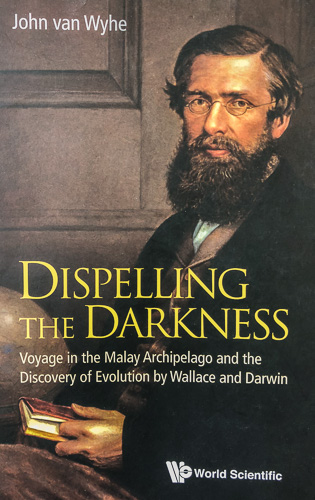
As an unashamed, self-confessed Darwin groupie, I should perhaps come clean at the start by saying that, although I also have a major soft-spot for Alfred Russel Wallace, the recent tendency to describe him as ‘forgotten’ or ‘overlooked’ or ‘the discoverer of evolution you’ve never heard of’ irks me immensely. Alfred Russel Wallace has always been, and remains, an important figure in the history of the biological (and geographical) sciences. The fact that he is not as famous as Charles Darwin is hardly surprising: few other scientists are. While Alfred Russel Wallace did indeed independently come up with an idea uncannily similar to Darwin’s Natural Selection, he is not as famous as Darwin, quite simply, because he did not write On the Origin of Species. Wallace was a fascinating character who made genuinely important contributions to science. We should celebrate him in his own right; not constantly refer to him as somehow being overshadowed by Darwin.
John van Wyhe takes the main title for his book from a quote by Thomas Henry Huxley, who referred to Charles Darwin and Alfred Russel Wallace having ‘dispelled the darkness’ at ‘the heart of the species problem’. But van Wyhe dispels plenty of darkness himself in this enjoyable, meticulously researched work. In particular, he debunks numerous misunderstandings, myths, and conspiracy theories surrounding Alfred Russel Wallace and his ‘co-discovery’ of the natural selection with Charles Darwin.
The book concentrates primarily on Wallace’s time collecting specimens in the Malay Archipelago. Interspersed amongst accounts of Wallace’s travels, van Wyhe explores how Wallace developed important theories concerning the succession of species, the distribution of species, and, most famously, what we now think of as natural selection. In the process, van Wyhe debunks such ideas as:
- Wallace being ‘overlooked’ because he was working class. (He was middle class.)
- Wallace’s original concept of how natural selection works being identical to Darwin’s. (They were certainly similar, but there were important differences.)
- Wallace’s theory of evolution being identical to Darwin’s. (Darwin, with a twenty-year head-start on Wallace, unsurprisingly, took numerous factors into account that Wallace never considered, including, as Wallace himself noted after first reading Origin: “the laws of variation, correlation of growth, sexual selection, the origin of instincts & of neuter insects, & the true explanation of Embryological affinities”.)
- Wallace having written his famous paper about natural selection on the island of Gilolo, not Ternate, as he himself recorded. (A seemingly trivial detail important to some conspiracy theories.)
- Wallace having written this paper with the original intent of sending it to Darwin;
- Wallace, like Darwin, having originally been inspired in his evolutionary theorising by the writings of Thomas Malthus;
- Wallace having been inspired in his evolutionary thinking by the racial affinities of the natives of the Malay Archipelago;
- Darwin and his friends having conspired to deprive Wallace of due credit for the theory of natural selection;
- Darwin having stolen the very idea of Natural Selection from Wallace;
- Wallace having been disappointed at not receiving enough credit;
- Darwin having deliberately delayed publishing his evolutionary theory out of fear of the scandal it would cause.
On the whole, I think van Wyhe makes an excellent job of debunking these ideas while in no way diminishing Wallace’s contributions to science. As I’m a self-confessed Darwin groupie, you (and no doubt the conspiracy theorists) might expect me to say that. But van Wyhe is careful to show his historian’s reasoning. He demonstrates time and again how Wallace was pretty hopeless at accurately recording dates (so his dates should not always be taken at face value). He demonstrates how timelines concocted by conspiracy theorists are either wrong, or make uncompelling conclusions if you dig deeper (e.g. into the timetables of shipping companies). He demonstrates how conspiracy theorists use inconsistent standards of evidence depending on whether it supports or weakens their arguments. And he demonstrates that there is nothing unusual (and, therefore, necessarily sinister) in there being missing documentation. It is not just fossil records that contain gaps!
I enjoyed this book even more than I expected. It probably won’t convince any conspiracy theorists, but what evidence ever would? But van Wyhe cuts through the bullshit to restore Wallace to his rightful place in the scientific pantheon.
Highly recommended.
- Buy this book from Bookshop.org (UK) and help tax-paying, independent bookshops.
- Buy this book from Amazon.co.uk
- Buy this book from Amazon.com
—
Disclosure: I have met John van Wyhe once. In 2009, he gave me and another Darwin groupie a private viewing of Charles Darwin’s old rooms at Christ’s College Cambridge. He also runs the excellent website Darwin Online, without which much of my own (amateur) historical research into matters Darwinian would be far more difficult.